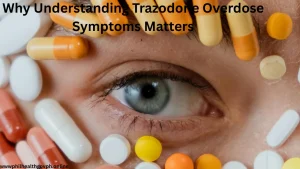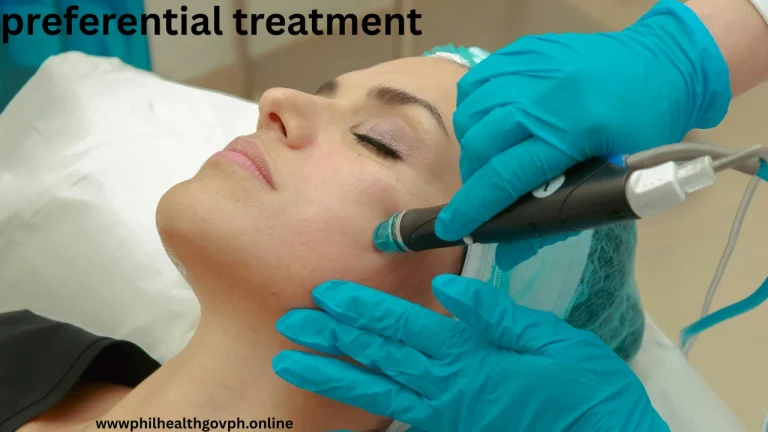Trazodone Overdose Symptoms: Overdose Risk
Trazodone is a widely prescribed antidepressant used for treating depression, anxiety, and insomnia. While it is effective when taken as directed, consuming too much can cause life-threatening complications. Understanding trazodone overdose symptoms is essential for patients, caregivers, and healthcare providers to recognize early warning signs and act fast.
You May Like: maxillary sinus cyst symptoms
What is Trazodone?
Trazodone belongs to a group of drugs called serotonin antagonists and reuptake inhibitors (SARIs). It balances serotonin in the brain, which improves mood and promotes better sleep. Doctors prescribe it for major depressive disorder, sleep disorders, and sometimes chronic pain management.
Although it is considered safer than some other antidepressants, misuse can lead to dangerous consequences. Overdosing may happen accidentally or intentionally, and the outcome depends on how quickly treatment begins.
Why Understanding Trazodone Overdose Symptoms Matters

Every year, thousands of people are admitted to hospitals due to drug overdoses. While trazodone is not as commonly abused as opioids or benzodiazepines, overdoses still occur. Knowing the symptoms helps family members, friends, and patients identify when emergency help is needed.
Without timely treatment, an overdose may lead to permanent organ damage or death. Early recognition saves lives.
Causes of Trazodone Overdose
Several factors can lead to overdose, such as:
-
Accidental double dosing when a person forgets they already took their medication.
-
Mixing trazodone with alcohol or sedatives that slow the nervous system.
-
Intentional overdose as a form of self-harm.
-
Incorrect prescriptions or patients ignoring medical advice.
These situations increase the concentration of trazodone in the bloodstream, producing toxic effects.
Common Trazodone Overdose Symptoms
The early warning signs may appear within hours of ingestion. Some of the most common symptoms include:
-
Extreme sleepiness or sedation.
-
Blurred vision and dizziness.
-
Nausea, vomiting, or stomach pain.
-
Fatigue and confusion.
-
Headaches and tremors.
These are not always fatal but serve as a red flag that the body cannot handle the dosage.
Severe Trazodone Overdose Symptoms
In more serious cases, the overdose escalates to severe medical conditions. Patients may experience:
-
Difficulty breathing.
-
Seizures or convulsions.
-
Irregular or dangerously slow heartbeat.
-
Sudden loss of consciousness.
-
Drop in blood pressure leading to shock.
-
Coma in extreme situations.
These symptoms demand immediate hospitalization. Delay in treatment can be fatal.
Cardiovascular Complications
One of the most serious effects of trazodone overdose is its impact on the heart. The drug may cause:
-
Palpitations.
-
Abnormal heart rhythms (arrhythmias).
-
Sharp drops in blood pressure.
-
Risk of cardiac arrest in high doses.
Patients with existing heart problems are at greater risk.
Neurological and Mental Health Effects
Trazodone affects the brain’s neurotransmitters. During overdose, neurological complications may appear, such as:
-
Confusion and agitation.
-
Restlessness and irritability.
-
Hallucinations or delusions.
-
Muscle twitching or stiffness.
-
Seizures in severe cases.
The brain is highly sensitive to serotonin imbalances, making these symptoms extremely dangerous.
Serotonin Syndrome and Trazodone Overdose
One of the most life-threatening complications is serotonin syndrome. This condition occurs when serotonin levels become excessively high. Symptoms include:
-
Shivering and sweating.
-
Rapid heartbeat.
-
Fever and agitation.
-
Muscle rigidity.
-
Tremors and confusion.
If untreated, serotonin syndrome can lead to seizures, organ failure, and death.
Gastrointestinal Symptoms
Trazodone overdose also affects the digestive system. Patients may suffer from:
-
Persistent nausea.
-
Abdominal cramps.
-
Vomiting blood in extreme cases.
-
Diarrhea or constipation.
Though not always fatal, these symptoms contribute to dehydration and electrolyte imbalance, which complicates recovery.
Sexual Side Effects: Priapism
One rare but critical effect of trazodone is priapism, a painful and prolonged erection. In overdose cases, this symptom may appear more frequently and requires urgent treatment. If ignored, priapism can lead to permanent damage.
How Much Trazodone is Considered an Overdose?
The usual prescribed dose ranges from 50 mg to 300 mg daily. Some patients may take higher doses under medical supervision. However, consuming over 600 mg significantly increases the risk of overdose.
It is important to remember that sensitivity varies. A smaller dose may cause trazodone overdose symptoms in elderly patients or those with medical conditions.
Risk Factors for Trazodone Overdose
Some groups face a higher risk of developing overdose symptoms, including:
-
Elderly individuals with slower metabolism.
-
Patients with liver or kidney disease.
-
People mixing trazodone with alcohol or sedatives.
-
Those already taking other antidepressants.
-
Individuals with a history of drug misuse.
Treatment for Trazodone Overdose
When overdose is suspected, emergency medical care is critical. Treatment steps may include:
-
Monitoring heart and breathing functions.
-
Giving activated charcoal to absorb excess drug.
-
Administering IV fluids to maintain blood pressure.
-
Controlling seizures with medication.
-
Hospitalization in an intensive care unit for serious cases.
The success of treatment depends on how quickly medical care begins.
Recovery After Overdose
Recovery varies depending on dose, health condition, and time of treatment. Most patients recover fully with proper care. However, some may face:
-
Ongoing fatigue.
-
Memory problems.
-
Emotional stress from the incident.
-
Sleep issues.
Counseling and follow-up care are often needed to prevent recurrence.
Preventing Trazodone Overdose
Prevention is always better than treatment. To lower risks:
-
Follow the doctor’s instructions carefully.
-
Do not mix trazodone with alcohol.
-
Keep medication out of reach of children.
-
Use a pill organizer to avoid double dosing.
-
Report any unusual side effects to a healthcare professional.
When to Call for Emergency Help
Immediate medical help is needed if someone shows:
-
Seizures or convulsions.
-
Unconsciousness.
-
Trouble breathing.
-
Chest pain or irregular heartbeat.
-
Sudden confusion or hallucinations.
Calling emergency services quickly can save a life.
Trazodone Overdose in Children and Teens
Accidental ingestion by children can be extremely dangerous. Even small doses may cause severe reactions. Parents must keep medicines locked away. In teenagers, intentional overdoses may occur due to stress or depression. In such cases, both medical and psychological support are required.
Trazodone Overdose in Elderly Patients
Older adults process medications more slowly. This increases the chance of toxicity even at moderate doses. Elderly patients must be monitored closely, especially if they are also taking heart or sleep medications.
The Link Between Overdose and Mental Health
Many trazodone overdoses are linked to depression or suicidal thoughts. Mental health care is essential for recovery. Patients who experience overdose often need therapy, counseling, and support to prevent future incidents.
Long-Term Risks of Repeated Overdose
Repeated overdoses or high exposure to trazodone can cause:
-
Chronic heart problems.
-
Permanent brain damage.
-
Reduced liver function.
-
Lasting psychological trauma.
This highlights why awareness of trazodone overdose symptoms is so important for prevention.
Trazodone Overdose Symptoms in the Digestive System
Overdose often impacts the digestive system quickly. Nausea, vomiting, and stomach cramps are among the earliest trazodone overdose symptoms patients notice. These signs may progress to dehydration and weakness if left untreated.
In severe cases, patients may vomit repeatedly, leading to electrolyte imbalance. The digestive discomfort is often mistaken for food poisoning, but when combined with other symptoms, it points to a drug overdose.
Trazodone Overdose Symptoms Affecting Breathing
Respiratory problems are another critical danger. Shallow breathing, difficulty catching breath, or slowed respiration are clear trazodone overdose symptoms. If breathing becomes dangerously low, oxygen supply to the brain and organs decreases.
This complication is more common when trazodone is mixed with alcohol or sedatives. Because breathing problems can lead to unconsciousness, they require immediate emergency treatment.
Frequently Asked Questions
What are the first signs of trazodone overdose?
Extreme drowsiness, dizziness, nausea, and confusion are usually the first signs.
Can trazodone overdose be fatal?
Yes. Severe cases can lead to seizures, heart failure, or coma if untreated.
How quickly do symptoms appear?
Most appear within 2–6 hours after taking an excessive dose.
Is it dangerous to mix trazodone with alcohol?
Yes. Alcohol increases sedation, breathing problems, and risk of overdose.
Can you recover fully after a trazodone overdose?
Yes, with fast medical treatment, most patients recover. However, long-term care may be required in some cases.
Conclusion
Recognizing trazodone overdose symptoms is a life-saving skill for anyone taking or prescribing this medication. The signs range from mild drowsiness and nausea to severe complications like seizures, serotonin syndrome, and heart failure.
By following prescriptions, avoiding dangerous combinations, and seeking medical help in emergencies, patients can use trazodone safely. Knowledge and awareness remain the best defense against overdose risks.
People Also Read: mango allergy symptoms





